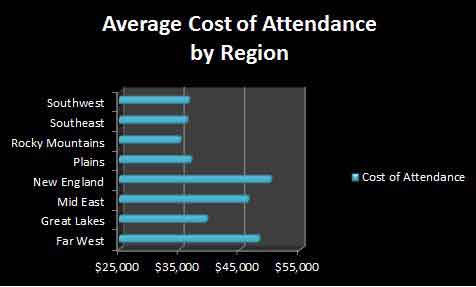(This is part 4 of Comparison of Top 11 College Search Engines)
Most college students attend a school within a four-hour drive of their home. Fifty percent are actually within 100 miles of their home. Location is usually one of the primary factors in the college search. It is the first option for five of the eleven college search websites and a near the top in three more. Seven of the websites offer the option to search by distance from a zip code.
Location appears to be important in terms of being close to home. In fact, College Reality Check only offers two options for searching by distance from zip code, 50 and 100 miles. It looks like the college search process for most families is concentrated on staying close to home.
And this is a shame since location can cost families as much as $15,000 per year. The following graph shows the average cost of attendance for private colleges by region.
 The average costs range from a low of $35,000 in the Rocky Mountains region to a high of $50,000 in the New England region. You can see a similar pattern if you look at average net cost after gift aid. The lowest averages are in the Southeast and Rocky Mountains with the highest in New England and the Far West.
The average costs range from a low of $35,000 in the Rocky Mountains region to a high of $50,000 in the New England region. You can see a similar pattern if you look at average net cost after gift aid. The lowest averages are in the Southeast and Rocky Mountains with the highest in New England and the Far West.
It’s not just that prices are lower in “fly-over” country. Colleges are interested in creating diverse classes and this includes geography. That means that students have a potential geographic “hook” by looking at colleges outside their region. Schools are more likely to offer students money to attend their school if they are not from the immediate area.
Besides cost, there is the potential advantage of having a different experience to offer employers “back home” by graduating from school outside your immediate region. The argument that by going to school close to home allows you to build contacts to help you find a job locally can be turned around to by going to school elsewhere allows you to offer your potential employer business contacts useful for expansion.
Virtually any argument against attending college far from home can be turned into an advantage depending on your perspective. And perspective has real costs attached to it.
So how good are the websites at allowing users to select schools based on location? Seven of the websites allow you to search by distance from a zip code but only three of them allow you to choose the distance. The other websites require users to select from distances ranging from 5 miles to 3,000.
Only seven of the websites allow for searches based on multiple states. In other words, users can search on Virginia and Maryland. And for two of the websites, you’ll have to select the states one at a time. For example, select Maryland, hit enter, select Virginia, hit enter, instead of allowing you to check multiple boxes or select multiple state from a drop down list.
Besides the obvious limitations the state search options will cause the website users, it has annoying implications for my review. It means that I can only compare the results of the seven websites that allow users to choose multiple states.
| Website | Select by State | Select Multiple States | Select Distance from Zip | Enter Your Own Mileage |
| Big Future | Y | Y | Y | N |
| Cappex | N | NA | Y | Y |
| CollegeData | Y | Y | N | NA |
| CollegeNavigator | Y | Y | Y | N |
| CollegeProwler | Y | N | Y | Y |
| College Reality Check | Y | N | Y | N |
| CollegeView (SuperMatch) | Y | Y | N | NA |
| CollegeXpress | Y | Y | N | NA |
| My College Options | Y | Y | Y | Y |
| Peterson’s | Y | Y | Y | NA |
| Unigo | Y | N | N | NA |

3 thoughts on “Comparison of Top 11 College Search Engines: How Far Away Should You Go To College?”